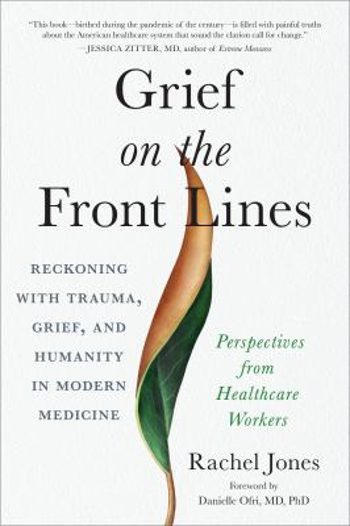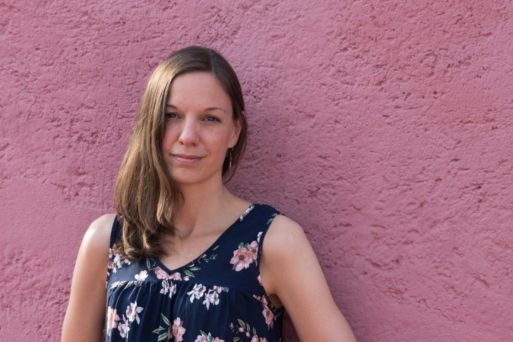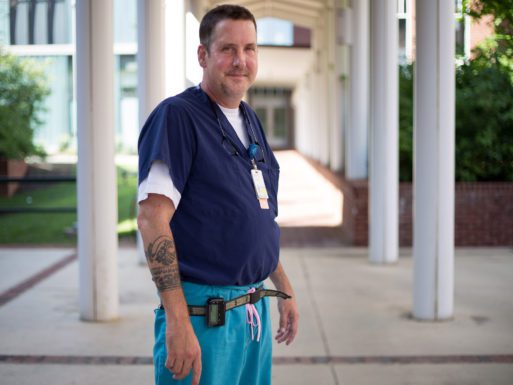
The world of medicine and professional caregiving is fraught with trauma. Doctors, nurses and ancillary staff members experience human suffering in a way that most laypeople can only imagine, witnessing people at their most vulnerable, often on the worst and sometimes on the last day of their lives. These experiences leave their mark, and eventually, for many health care workers, extract an enormous price.
In “Grief on the Front Lines,” journalist and author Rachel Jones explores the many factors that have coalesced over decades to leave an unprecedented number of U.S. healthcare workers traumatized, depressed and burnt out. Through literally hundreds of interviews with doctors, nurses, social workers, clergy, paramedics and volunteers, she paints a grim picture of the culture of American health care and how the system dehumanizes its workforce. From doctors-in-training who are routinely humiliated by their superiors for even the slightest misstep, to nurses who consistently have too few resources to do their jobs well, Jones recounts story after story of human beings pushed to the brink by cumulative trauma, grief, depression and PTSD. Some of them turn to substance abuse to numb the pain, while a disturbing number see suicide as the only way out. Doctors — anesthesiologists in particular — have a suicide rate that’s more than double that of the general population. And as one reads their stories, it is easy to understand why.

Rachel Jones, author of “Grief on the Front Lines”
And it’s not just the daily encounters with human misery that’s driving their suffering, Jones explains. There is a culture in many if not most U.S. hospitals that encourages bullying and even abuse by superiors, especially by doctors whose practices contribute heavily to the hospital’s bottom line. Operating rooms in particular can become battlefields — one nurse recounted more than one instance of surgeons hurling sharp, bloody instruments across the room when they became upset. Nor is the bullying limited to doctors — it’s a truism in the nursing profession, Jones explains, that far too many senior nurses “eat their young.” And while these behaviors are undoubtedly born of deep frustration and distress, they are no less destructive because the perpetrators are victims themselves.
Healers in Distress
“Victims”, in fact, is the term I began to use in my own mind as I read the stories in “Grief on the Front Lines.” Almost universally, the doctors, nurses, social workers and clergy Jones interviewed for the book entered their respective professions because they wanted to serve humanity in some way. But when that calling leaves them suffering — as any human forced to navigate the emotional minefield in which they spend most of their days would — the system fails them again and again. Doctors and nurses who seek mental health care are stigmatized to the extent that they often choose to forgo treatment rather than run the risk of being “found out.” And a serious mental health challenge can even threaten their license and their livelihood. In one instance recounted in the book, a doctor whose depression led to a failed suicide attempt lost his job and was placed in a 5-year monitoring program by the Virginia state licensing board. Forced to attend Alcoholics Anonymous meetings and undergo regular drug screening despite having no history of drug or alcohol use, he eventually left the state and moved to Oregon, where the state’s physician health program was much more supportive.
Glimmers of Hope
Despite its grim stories that paint an even grimmer picture of the inner workings of American healthcare, “Grief on the Front Lines” is also a book about change and hope. Many of the health care workers Jones interviewed for the book have since left their professional roles to form organizations whose mission is to offer support and healing to workers on the front lines. Albert Wu, for example, a physician who penned a short essay titled “The Second Victim” after he made a grave error that could have ended a patient’s life, is now a professor of Health Policy at Johns Hopkins where he founded a program “Resilience in Stressful Events” (RISE). The program offers crisis counseling and peer support to health care workers when a patient experiences a bad outcome, regardless of whether an error occurred. That program has evolved into a statewide Caring for the Caregiver program that has trained multiple hospital systems across the U.S.

Jonathan Bartels, an ER nurse at the University of Virginia, has helped others process trauma and grief by implementing a moment of silence following the death of a patient. He calls it the Medical Pause
Other professionals such as Elizabeth Metraux and Meredith Mealer have started writing programs for professional nurses to help them process trauma and develop resilience and more robust coping skills. Still others have implemented programs that help health care workers tap into their creativity as a means of expressing emotions they may otherwise feel they have to hide.
And then there’s Jonathan Bartels, an Emergency Room nurse who, after attending the deaths of many, many patients, implemented “The Pause” — a moment of silence after a death in which health care workers honor the transition and begin to process their grief. The practice is now common in health systems across the U.S.
Still, Jones’ book leaves no doubt that much work still needs to be done.
Coming as it does after more than two years of a global pandemic that has caused over 1 million American deaths and led to untold trauma to health care workers nationwide, “Grief on the Front Lines” is a clarion call that we would all do well to heed. America is losing doctors and nurses at a frightening pace: The AMA estimates that by the year 2034 the U.S. will experience a shortfall of between 37,800 and 124,000 physicians in both primary and specialty care, and according to a study published in the American Journal of Medical Quality, by 2030 there will be a shortage of over 500,000 nurses across the U.S. At the same time, the Baby Boomers are aging and requiring more and more medical care each year.
It’s a frightening scenario, but it’s possible that we can avoid a full-on disaster if we pay attention now. As Jones says in the final lines of her book “Now at least we know where we are. ‘Where to next?’ is an open question.”
Editor’s note: Rachel Jones is a long-time contributor to SevenPonds and a valued member of our team. Her feature-length article, “New Rituals Lessen the Trauma of Code Blue for Physicians” was the initial inspiration for this incredible book.

 “Grief on the Front Lines” by Rachel Jones
“Grief on the Front Lines” by Rachel Jones


 Octogenarian Author Jane Seskin Offers a Model for Aging and Living Well
Octogenarian Author Jane Seskin Offers a Model for Aging and Living Well

 Are “Rage Rooms” a Healthy Outlet for Grief and Burnout?
Are “Rage Rooms” a Healthy Outlet for Grief and Burnout?














